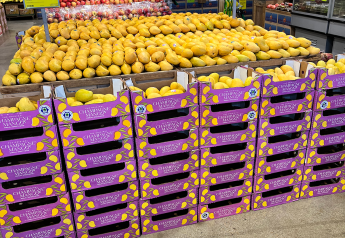How California table grape growers are staying competitive
![“The consumer wants better quality [grapes], and the bar is set higher,” says David Magana, Rabobank senior fresh produce analyst.](https://cdn.farmjournal.com/s3fs-public/styles/840x600/public/2022-08/RabobankTable%20GrapesEDIT.jpg?itok=ytNdzJIR)
Table grape growers around the world are adopting proprietary cultivars that offer higher yields and enhanced fruit quality, finds a new report from Rabobank titled, “Better-Quality Grapes Offer a Bunch of Reasons to be Grateful.” The result, says the Netherlands-based cooperative bank, is higher-quality grapes that “show positive price trends at higher-end retail chains.”
“The consumer wants better quality, and the bar is set higher,” David Magana, Rabobank senior fresh produce analyst, told The Packer. “Growers need to continue to offer a better eating experience.”
But while growers from California to Mexico to South America seek to offer elevated table grape quality, they do so in the face of heightened challenges.
“High consumer expectations are colliding with supply-side challenges, including water, labor and logistics,” said Magana. U.S. consumers are increasingly demanding higher-quality grapes, year-round.
However, these challenges will continue to drive opportunities and innovation, said the Rabobank report.
California production, exports
Table grapes are some of world’s main exported fruits, with global table grape exports reaching a record 4.3 million metric tons in 2021, according to the report.
In the U.S., the table grape industry belongs to California, which produces 99% of the nation’s supply of the fruit. The U.S. industry expects a crop of 95 million boxes for 2022, down from the 110 million boxes California has produced during most of the last decade, according to the report.
The reason for the decline is strategic and mostly financially driven, said Magana. “2018 saw a bumper crop and prices were low. For some growers — particularly growers of conventional cultivars — that meant a below break-even [season].”
By focusing on quality and proprietary cultivars with higher yields versus straight quantity, growers create greater opportunity for profitability.
The report further notes that U.S. table grape export volumes declined 36% between 2012 and 2021, but the country’s exports to Mexico and Canada “remain firm” at a combined 60% of U.S. export volumes in 2021.
Table grape pricing
Average table grape prices at U.S. retail have shown no upward trend over past several seasons, says Rabobank, suggesting that the increases in input and transport costs have been primarily absorbed by operators along the supply chain.
“In contrast, retail prices in the higher range reflect a positive trend,” said the report. “Higher prices are associated with higher quality grapes and higher end retail stores. Focusing on premium segments of the market could enable shippers/marketers to partially pass on the increases in production costs and protect margins.”
California’s competition, advantages
The U.S. is one of the largest importers of table grapes in the world, second only to Europe, according to Rabobank. From 2012 to 2021, total U.S. table grape import volumes increased 21%, with imports from Peru growing sevenfold.
“The main competition for California at the front of the season is Mexico, which also has a larger supply of proprietary cultivars,” said Magana. “From July to November, California doesn’t face competition from imports. So, it’s mostly that providing consumers with better-tasting grapes is the way to keep the category relevant.”
In the back season, California does face some competition from early season Peruvian grapes. Peru also focuses on proprietary cultivars, which represent 60% of the country's exports, said Magana.
In the end, California table grape’s main competitor is not imports from another country, but rather other summer fruits such as berries, he said.
One significant advance for California is increasing demand for grapes at home.
“Chile and Peru don’t have as strong of a domestic market, so that’s an advantage for California because consumers can get fresher grapes that were harvested just a few days before,” said Magana, who adds that, given ongoing supply chain bottlenecks, it may take weeks for imported grapes to reach retail shelves.
And while water and labor will continue to be issues for California grape growers, the more efficient growers focused on delivering a higher-quality fruit are well-positioned moving forward.
“In California, most growers say they have a good source of water and will continue to allocate scarce water to crops that offer a better economic return,” said Magana. “The switch from conventional to proprietary cultivars not only creates a better eating experience for the consumer, but also more input efficiencies and crops with higher yields.
“In the future, table grapes will continue to be an important part of California’s fruit portfolio,” he said.







